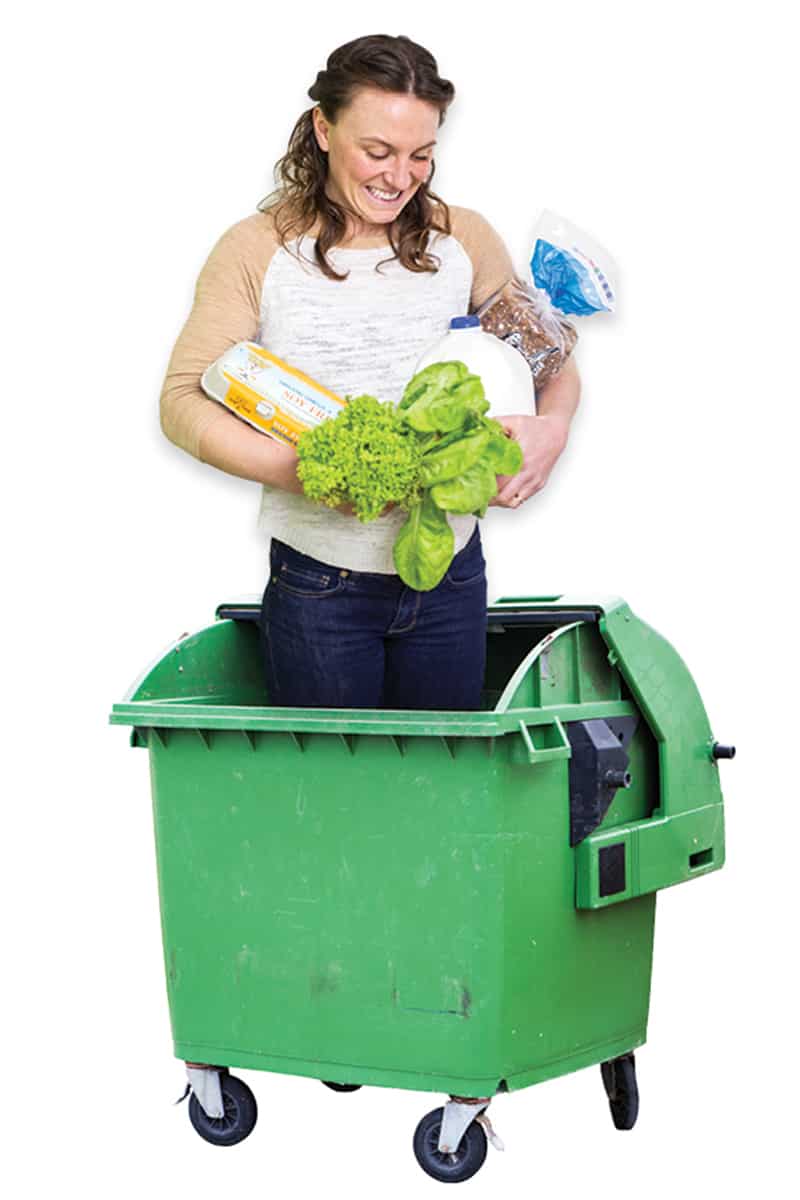Read The
Current Issue
Hole Food Rescue
Once strictly an amateur, Ali Dunford has turned the art of ‘dumpster diving’ into a respectable profession.
By Dina Mishev

THE PHONE CALL came in just before I arrived at Hole Food Rescue (HFR) to interview founder and co-executive director Ali Dunford: Wyoming Game & Fish Department is offering the nonprofit a whole elk, confiscated from the person who harvested it illegally. Indeed, HFR could help feed a lot of people with several hundred pounds of elk meat, but the two freezers in its newly remodeled space in West Jackson are full of loaves of bread.
HFR “rescues” surplus food from valley grocery stores, markets, and restaurants, then donates the items to more than twenty different groups around the valley. Daily, HFR rescues about six hundred pounds of food and redistributes it to their partner organizations. In a lobby made cheery by blooming tulips in pots on a windowsill—HFR also rescues flowers from local food stores—Dunford and director of operations Hannah Cooley have a brief conversation about which partners might be able to use the loaves of frozen bread. The Senior Center? The Good Samaritan Mission? Jackson Cupboard?
“We’ll get it figured out,” Cooley says.
IN 2012, WHEN Dunford moved to Jackson Hole from Boulder, Colorado, where she grew up and went to college, she was already a dumpster diver. “In college I started dating a dumpster diver,” she says. “I had no idea what it was until he showed me. Everything we ate came out of the trash and he’d make these amazing meals. That’s where I learned about food waste, and how much of it happens.”
A 2013 report co-authored by the Natural Resources Defense Council (NRDC) and Harvard Law School’s Food Law and Policy Clinic estimated $900 million worth of expired food is removed from the United States supply chain every year. Little of this food is actually bad: According to the report, “Expiration dates are in need of some serious myth-busting because they’re leading us to waste money and throw out perfectly good food, along with all of the resources that went into growing it. Phrases like ‘sell by,’ ‘use by,’ and ‘best before’ are poorly regulated, misinterpreted, and leading to a false confidence in food safety.”
In Jackson, Dunford rented a place behind what is today Lucky’s Market but in 2012 was Jackson Whole Grocer. “I became this dumpster renegade, and showed friends how to do it,” she says. “We’d go day after day, and it was always a bounty. All of the selection that was inside the store would eventually make it to the dumpster.”
AFTER EIGHT MONTHS of doing this, “I reached a breaking point,” Dunford says. Her breaking point wasn’t that she had had enough of eating food snatched from the trash, but that there was so much food in the dumpster. And that was just one store. She had worked at Boulder Food Rescue for two months after graduating from the University of Colorado, so “I knew there was a solution,” she says. She approached Whole Grocer owner Jeff Rice about rescuing the food the store threw out. “He was into the idea immediately,” she says. Within two months, Dunford was also rescuing food from Albertsons. Then came Persephone Bakery, the Farmers Market, Aspens Market, and several restaurants including Picnic. Lucky’s Market partnered with HFR as soon as it opened, and Smith’s finally signed on as a partner last fall.
The nonprofit moved out of Dunford’s garage in September 2014 and by July 2015 was able to pay Dunford a salary and hire co-executive director Jeske Gräve. Cooley was hired in February 2017. Volunteers—there are about eighty of them and Dunford says HFR is always looking for more—do the majority of food rescue, sorting, and deliveries. There are about sixty volunteer shifts a week.
In 2017 Hole Food Rescue saved 213,010 pounds of food from going to waste and helped feed around a thousand Teton County residents every week. “We have an amazing amount of support from the community, through donors and volunteers,” Dunford says. “Obviously, food rescue exists elsewhere, but there is something about the closeness and intimacy and size of Jackson that made it relatively accessible to do this and for it to take off so quickly. This was just a crazy idea I had and now we’re feeding a thousand people.” For information on becoming a HFR volunteer or to donate, go to holefoodrescue.org/volunteer.




